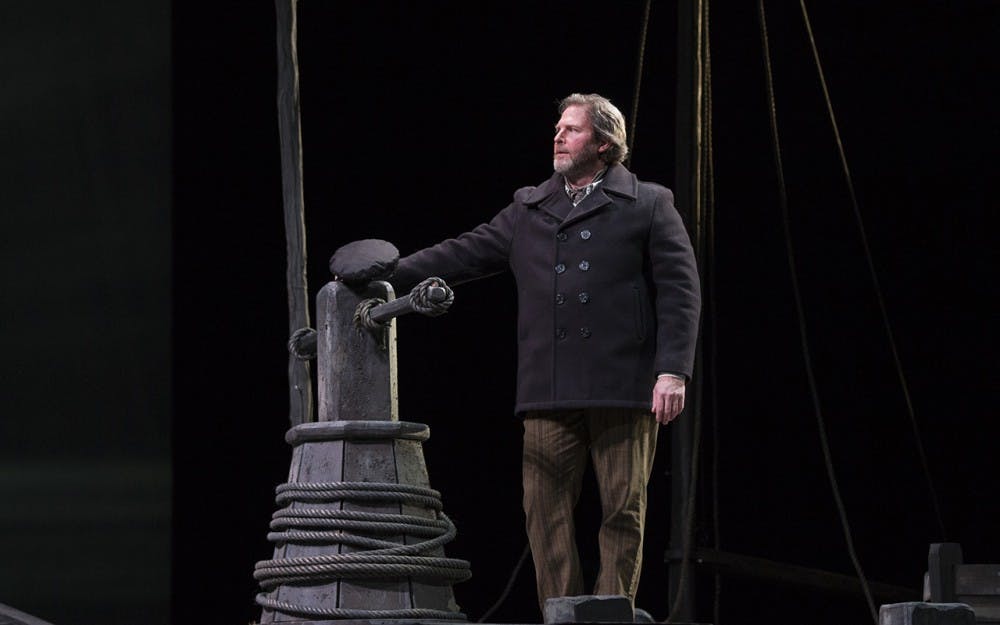Peter Grimes has been accused of murder. His apprentice, a poor boy from a small, English fishing village, died while working with the fisherman at sea. But Grimes insists from the beginning he is innocent.
The production starts in a courtroom where Grimes is immediately on the witness stand in front of the whole town, but they have already convicted him.
The Jacobs School of Music will open “Peter Grimes,” at 7:30 p.m. Friday, but IU isn’t the only one experiencing the story of this opera, or other story lines like it.
The production’s stage director, Chris Alexander, said this opera is being performed all over Europe and the United States.
“It’s because of what’s going on now, not only in the States, but very strongly in Europe, with immigrants and sort of this outcast business of being not welcome,” he said. “It’s much in our time and this opera brings it very strongly.”
The title character, Grimes, is ostracized from the beginning of the story. He’s a strange and lonely character, but it becomes worse after his apprentice dies. Although the town coroner rules his apprentice’s death an accident, the town refuses to give him another apprentice.
The townspeople ignore Grimes, refuse to help him and begin singing “talk of the devil and there he is” when he enters the local pub. Grimes is frustrated the town won’t give him a second chance. Eventually, he’s driven mad by the constant rejection and animosity he feels from his community.
The opera’s story has many similarities to original composer Benjamin Britten’s own life.
Alexander said Britten was an outcast in multiple ways. First, he was a pacifist and moved from England to the U.S. in hopes of avoiding World War II. Like Grimes, Britten was from a small fishing village and they hated him for abandoning his country at such a desperate time.
Secondly, when Britten moved to the U.S., he did so with his partner, Peter Pears. Pears and Britten came under scrutiny for their relationship from the community. People contacted police and insisted they uphold the Victorian laws punishing homosexuality, which were still in effect at the time.
Britten worked on the opera with Pears and wrote the music and Grimes’ character specifically for him to perform.
“It was very much their baby, this thing,” Alexander said. “It has a lot to do with their own story of being outcasts in their society.”
Christina Nicastro, who plays the village’s schoolteacher and one of Grimes’s only friends, said the opera is supposed to make the audience think.
“My hope is that every audience member leaves feeling a little unsettled,” she said. “It’s not a happy opera. It makes your worldview change.”
Nicastro said everyone could relate to the opera’s theme of being an outsider because at one point or another, everyone’s been one. People can also relate to her character, who is the only one who stands by Grimes when the rest of the village turns against him.
Grimes wants to marry her, and Nicastro said it could be seen as a way for him to fit in the community again. She’s his only connection with normalcy.
This makes Nicastro’s character a layered one, which can be difficult to portray on a stage with more than 50 people on it at once.
The chorus of “Peter Grimes” is one of the largest with 55 members, not including the 12 principal characters.
“The chorus itself is almost its own character,” Nicastro said. “There’s something that’s always happening. If you went to two performances, you’d be catching differences all the time.”
This is Nicastro’s first major role at IU and the biggest chorus she’s ever worked with in an opera.
“I’m nervous,” she said. “But I’ve embraced the nervousness and I use it in my character and my singing.”
Alexander said it’s important for the audience to read into the characters deeply because each one is nuanced. The opera is in English and will have supertitles to help the audience understand the full text.
“I want to make an emotional and intellectual impression on the audience,” Alexander said. “It has a lot to do with us. It’s a huge problem in any human society. There’s always these outsiders who are not outsiders because they deserve to be, but because they were made as such.”






